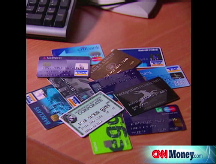Speed-dating for businesses
Hopeful startups seek that magic spark at gatherings that pair big companies with entrepreneurs.

DELRAY BEACH, FLA. (Fortune Small Business) -- David Michaels sports a bona fide mane, sculpted and flowing, like a modern-day Bee Gee. Around his neck hangs his lucky red rep tie from Saks (SKS). In his hand: a comb with a built-in laser, meant to foster follicle growth.
Michaels, 44, is speaking with great animation to Karen Leeker, the external-business-development manager for Procter & Gamble (PG, Fortune 500)'s consumer health-care division. "Our target market has a different emotional makeup," says Michaels. "They are extremely distressed about hair loss. It's a unique challenge ..."
Ding! the bell sounds.
"It was a pleasure meeting you," says Leeker, standing and extending a hand.
"Thanks!" Michaels replies, blinking rapidly.
Michaels and Leeker are participants in Speed-Dating for Innovation, a business-to-business matchmaking event in Delray Beach, Fla. The sponsor is Venture2, a business brokerage that focuses on connecting small and large companies. Since founding Venture2 in 2004, CEO Mike Docherty, 50, has mainly worked as an individual matchmaker. But Speed-Dating struck him as a smart opportunity to expand his business.
Since it first appeared in the late '90s, speed-dating has caught on quickly as a way to forge business connections as well as romantic pairings. Around the country, Chambers of Commerce hold sessions that allow members to meet and greet at warp speed. And the Small Business Administration runs a program that introduces businesses to procurement officers who can offer lucrative government contracts. There's even an event that matches cash-hungry startups and venture capitalists and puts them on ski-lift rides, forcing the entrepreneurs to make their pitches in the few minutes it takes to travel up the slope.
Why not use speed-dating to connect small and large companies, thought Docherty? He's the first to attempt that particular twist, and there don't appear to be any competitors yet, but his timing seems impeccable. In recent years big companies have started to look outside for new products and services. Why invent everything in-house when so many amazing new products are being created, especially by small businesses?
Six large corporations showed up at Venture2's event, including GlaxoSmithKline (GSK), Kimberly-Clark (KMB, Fortune 500), and Procter & Gamble.
Take P&G. With $85 billion in revenues, simply growing its top line a modest 4% annually requires $65 million of new sales every week. There's simply no way to achieve that pace without ideas from the outside. As a consequence, more than half of P&G's product line now has input - be it packaging, a component, or the entire product - from other companies, many of them small. That's up from roughly 10% in 2000.
Meanwhile, GSK recently designated a dozen employees as outsourcing "scouts." The company has drawn up a list of around 50 "wants"- products that might make sense or markets GSK would like to break into. The scouts scour the globe, attending conferences and trade shows, looking for companies that might be able to fill GSK's wish list of promising innovations.
All the entrepreneurs at the event understand that they are protected only by their own patents. Docherty has them sign an agreement not to reveal any confidential information at the dating stage. While the little guys may fear being ripped off, large companies are equally afraid of small competitors falsely claiming they invented something the company might have developed years ago.
"For this reason," he says, "large companies will typically only look at ideas that are already protected - e.g., patented and not subject to nondisclosure agreements."
The eight small companies at the speed-dating session all qualify as cutting-edge. Besides Lexington International, the Boca Raton outfit behind the HairMax laser comb, there's LifeChek, a Pittsburgh company that makes a skin patch for measuring daily caloric burn. Aemed, a Miami company with roughly $1 million in revenues in 2007, is peddling a handheld pain-relief device called the StimPad. It looks like a computer mouse and delivers a small electrical shock to the user.
The eight small companies paid $2,500 apiece to participate in Venture2's match-making event. (The event was free for large-company participants.) Some of the small outfits already have products on the market: Lexington International sold $17 million worth of laser combs in 2007. Others are at earlier stages, but all have reached a point where they feel they must partner with a larger company to grow.
None of the small companies expects speed-dating to result in an instant acquisition. That would be like getting married after the first romantic dinner. Rather, the small companies hope that these dates will lay the groundwork for any of three more realistic outcomes.
They could reach a standstill agreement, where they receive money in exchange for letting a large company examine their business exclusively. A development agreement is also possible, where a large company invests cash tied to various milestones, such as getting FDA approval for a new drug. Or there's licensing, an arrangement where a large company distributes a product and pays royalties to the small manufacturer.
All too soon, the first round is over. The companies have met one another. Now the big guys must decide who to pick for second dates. The participants repair to various corners of the conference room.
Christopher Craig, a vice president at Kaz, a large New York City- based company that makes humidifiers and thermometers, draws up a matrix. He places pluses and minuses beside the small companies according to a variety of criteria, such as their intellectual-property protection or whether they have carved out a genuine market niche.
"I met some companies I liked a lot," says Craig. "Others, not so much."
Next Docherty walks around the room, discreetly telling the entrepreneurs how they fared. The big winners, with four second dates apiece, are Burke, inventor of the pain-relief device, and LifeChek, maker of the caloric-burn monitor. Despite his lucky tie and a convincingly full head of hair, David Michaels scores only two second dates.
The moment the second dates are underway, it's clear they have a very different tenor. In the initial meetings, the small businesses did all the talking as they pitched their products. But now it's getting serious. The large companies have long lists of questions and concerns: How many patents do you have? When were they issued? What do you foresee as the cost of commercialization?
Hey, it's just like meeting the parents. ![]()
8 places to get cash when the bank says no
Is your idea safe?: Mark Publicover expects to spend the next decade in court fighting rivals that allegedly ripped off his invention.
The pricey path to patenting an idea
-
The Cheesecake Factory created smaller portions to survive the downturn. Play
-
A breeder of award-winning marijuana seeds is following the money and heading to the U.S. More
-
Most small businesses die within five years, but Amish businesses have a survival rate north of 90%. More
-
The 10 most popular franchise brands over the past decade -- and their failure rates. More
-
These firms are the last left in America making iconic products now in their twilight. More












